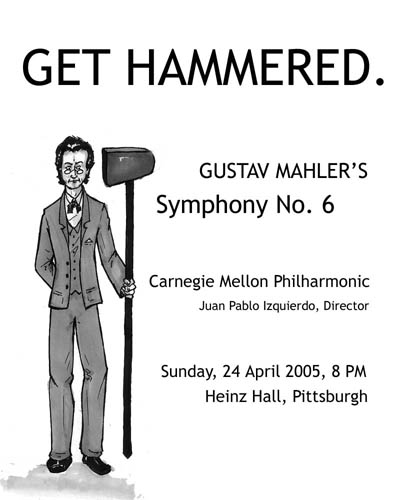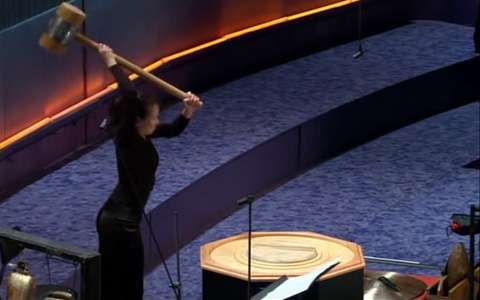Birthday Mahler 6
November 10 2013We saw Mahler 6 with the Seattle Symphony last night. This was somewhat of a birthday concert for me, as my birthday is coming up in a few days.
I was actually really hesitant to purchase tickets for this concert for two reasons. First, I was worried about the repercussions of seeing Mahler’s most tragic symphony on my birthday. This is the piece where Mahler wrote in his own ill-fated doom. Second, I dreaded seeing the Seattle Symphony playing this devilishly difficult piece. I thought I would just leave the concert angry after a bad performance. I was pleasantly wrong.
The concert opened with Boulez’s Notations for orchestra. Morlot talked about some of the melodies and themes of the 12-tone piece. Before each movement, a pianist played the piano version of the movement first before the orchestra played their version of the movement. To my ears, the piano version made more sense. It was played at a faster pace and sounded more jazzy than the orchestra part. I still don’t like 12-tone music.

After the short first half, we got Mahler 6 for the second half. I’ll start by saying that the Seattle Symphony totally came through here. This was the most energetic and well-played concert I’ve seen them play. I actually think there might be a theory at play here.
When I was with the Duluth Superior Symphony Orchestra, we played a concert that had just two pieces, Bach’s Orchestral Suite No. 1 and Mahler’s Symphony No. 1. By the time of the performance, we sounded much better playing the difficult Mahler than we did the simple Bach.
I think there’s a few reasons for this. The first is obvious - conductors will spend disproportionately more time practicing the difficult piece. The second has to do with motivation. Musicians need to find motivation in their jobs just like anyone else, and a difficult piece like Mahler brings out the willingness to focus and practice. Finally, there is the underdog mentality. A second tier orchestra like Seattle will want to make a statement with Mahler 6. This might be the most difficult piece they play all year, and they want to be able to play it well to justify their standing amongst the high tier orchestras, both as a signal to their audience and for their own self-confidence.
The first movement started off really fast, at a march pace that would be pretty difficult to actually march to. They slowed down after that and was downright slow for the Alma theme. I was impressed by how big a sound the orchestra made. This was the first time in watching this group that I felt like the orchestra was playing like one unified instrument. I was slightly disappointed by Alexander Velinzon’s solo in the first movement. He had a pretty weak sound and it looked like his bow arm was literally shaking. In general, he played the solos with a lot of big slides (not necessarily portamento, but even more obvious). This must’ve been a conscious choice.
The second movement was the Scherzo. There is some disagreement over the order of the two middle movements. Mahler originally wrote it as Scherzo then Andante. However, when he conducted, he changed it to Andante then Scherzo. I prefer having the Scherzo first. From a thematic perspective, the first and second movements are very similar and even in the same key (A minor). I think it makes more sense to drive home the futility and tragic nature of the symphony by combining the first two movements. The third movement will then be a reset, almost like a reminiscence of bygone times, before the fourth takes you back to present day struggles.
Next came the lovely Andante. This is one of my favorite standalone movements in the entire orchestral repertoire, let alone among Mahler’s works. The violins started the movement really well. The beginning is tricky - you have to *know* the tempo and move quickly and decisively. When I heard the CSO do this, there was uncertainty as to the tempo, and it screwed up the first phrase. I do have a couple disappointments here. The horn solo that takes over the melody from the strings was inexplicably played short and staccato. I think this might be just be nervousness on the part of the horn player - I would guess that it is a very challenging solo. Finally, I thought the climax could’ve been stronger. The climax for this movement is really difficult because it hits one climax, then the momentum needs to be sustained in order to hit the second climax about a minute later. I felt Seattle really nailed the first one, but didn’t adequately build up to the final one.
Finally, the huge last movement. At around 30 minutes, this movement is longer than many entire symphonies. The tuba absolutely nailed his part, and he managed to play it even pretty lyrically. I was really impressed overall by their playing in this movement. The musicians were really just into it, with people focused and at attention.

I was disappointed by the hammer blows. First, from my vantage point, I couldn’t see the percussionist, but I could see the hammer when it was raised to be played. The sound was pretty weak and was a very quick thud*. They skipped the third hammer blow, the one that Mahler notes as the death of the hero, the one that “fells him like a tree”. I prefer hearing the symphony with the third hammer blow in tact. Mahler removed it in an anxiety attack just before the premiere of the piece because he couldn’t go through with conducting what he felt was his own unfortunate fate. I think the symphony is more in line with Mahler’s original artistic vision when it includes all three hammer blows.
*The best hammer blows are in Ben Zander’s recording with the Philharmonia Orchestra. He describes having built a wooden crate with an opening on one side, and the hammer as a lead pipe.
The reception from the audience was lukewarm. Morlot only came back on stage twice; that is by far the lowest number I’ve seen for the end of a concert from the Seattle audience. Looking around during the symphony, I noticed a lot of people had fallen asleep. There’s no blame here. Mahler 6 is a very difficult piece to listen to, and it’s basically impossible to grok on first hearing. I’m just happy I was able to walk out with a smile and some hope that the Seattle Symphony might play with this type of intensity and focus at the next concert.
comments powered by Disqus